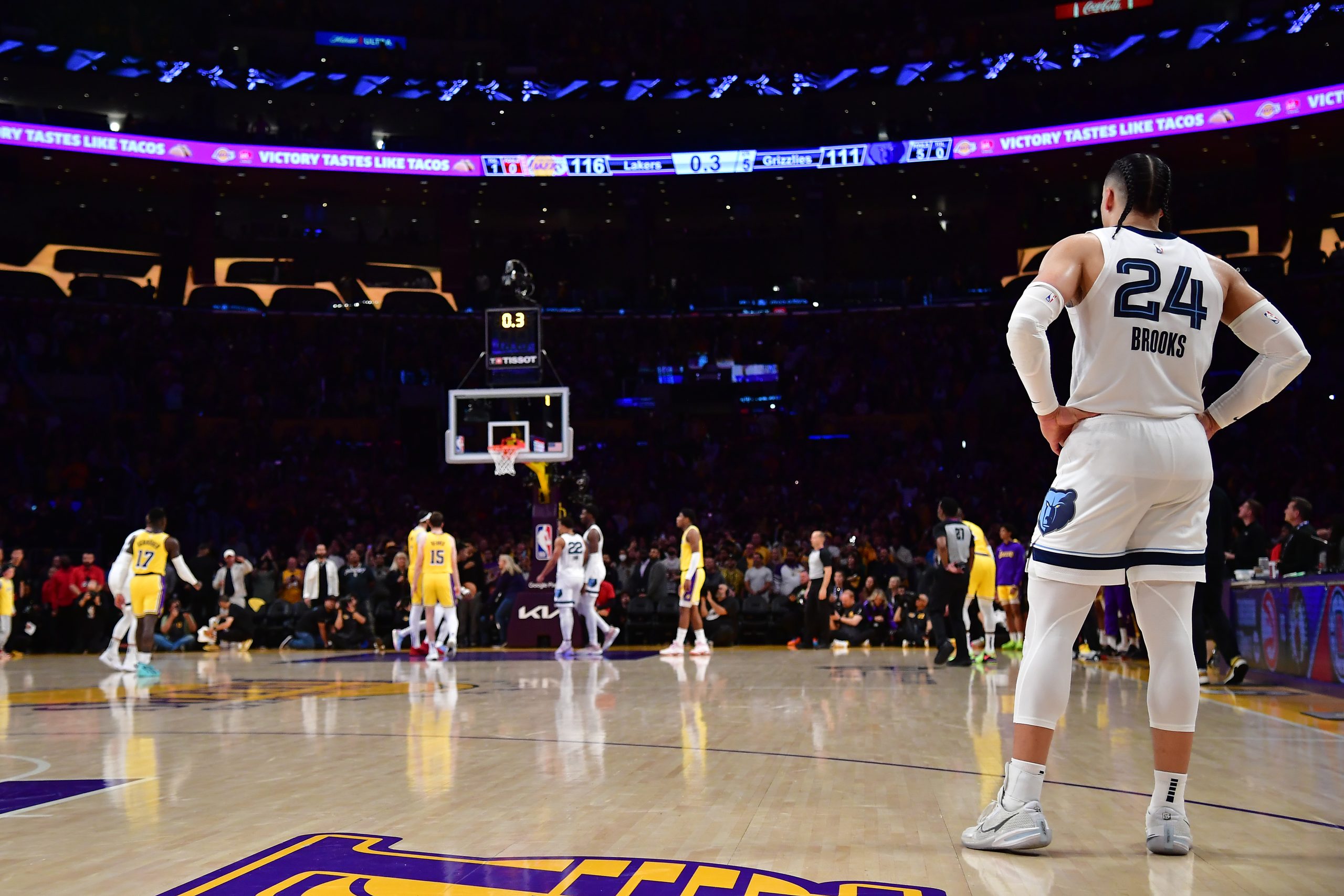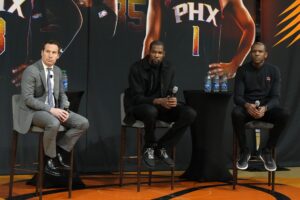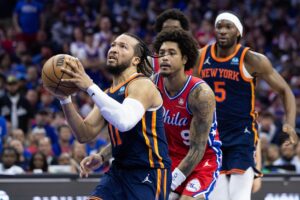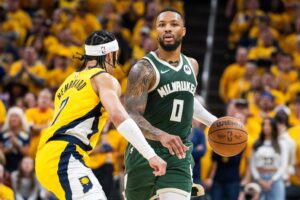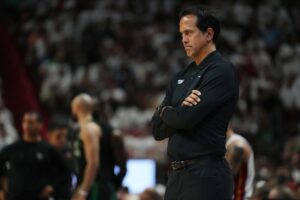Gauging the value of NBA contracts is complex. The value of contracts is constantly changing based on player performance, league trends, and the fluctuating cap. The length of the agreement, the player’s overall impact, age, injury history, and how it compares to other contracts around the league. These are all important factors to consider when determining the value of contracts.
Just because a player’s contract is bad value doesn’t mean that player is bad or overrated. It largely means they’re on impact doesn’t warrant the salary. Here is every Western Conference team’s worst-value contract.
Every Western Conference Team’s Worst Value Contract
Dallas Mavericks: Kyrie Irving (3 years, 120 million)
Kyrie Irving is a dazzling talent and one of the most gifted offensive players in the league today. However, with his injury history and off-court antics, Irving is a difficult player to trust. Additionally, the Kyrie and Luka pairing didn’t look amazing last year. Ultimately, the entire Kyrie Irving experience has a ton of risk. It’s tough to pay 40 million a year to a player with so much risk involved.
Denver Nuggets: Michael Porter Jr. (4 years, 149 million)
Michael Porter Jr. is a nice complementary piece around Nikola Jokic and an important part of Denver’s success. However, MPJ is held back by inconsistency on both ends of the court and a long history of injuries. As a result of inconsistent shooting, he fell out of the Nuggets late-game rotation in the finals. Ultimately, Porter’s contract suggested he is a star but his on-court contributions are that of a high-end role player.
Golden State Warriors: Chris Paul (2 years, 60 million)
Chris Paul is an all-time great point guard and basketball legend. But at 38 it’s clear his best years are behind him and he’s declined significantly. With the Warriors Paul will be fully entering the next stage of his career with a reduced role and fewer responsibilities. This is a star-level contract for a player that will now be expected to play as a high-level role player.
Houston Rockets: Dillion Brooks (4 years, 86 million)
The Rockets signing Dillion Brooks to this large contract was one of the most polarizing deals of the off-season. On the positive side, Brooks is an all-NBA level defender and quality role player. On the other hand, Brooks is an in-efficient shot-chucker with questionable IQ and poor playmaking skills on offense. Brooks’ drawbacks and unpredictable personality make this an incredibly risky long-term deal. From a value perspective, you could find much better role players than Brooks for a cheaper cost.
Los Angeles Clippers: Paul George (2 years, 94 million)
The Paul George and Kawhi Leonard era has been a massive disappointment for the Clippers. The era has been marred by injuries, load management, and a lack of postseason success. George is a star-level player but has an extensive history of injuries and is now entering the ladder stage of his career. George’s age and injury history paired with the Clippers postseason disappointments makes this a bad contract.
Los Angeles Lakers: Rui Hachimura (3 years, 51 million)
After being traded to the Lakers, Rui Hacimura’s value skyrocketed. Hachimura had some big moments in the playoffs which helped him earn a contract he otherwise would not. Hachimura is a solid role-playing forward but throughout his career, he hasn’t proven to be worth an annual salary of 17 million. At 24 Rui could take another jump and make this contract solid value but right now this feels like a slight overpay.
Memphis Grizzlies: Luke Kennard (2 years, 28 million)
The Grizzlies don’t have many bad contracts to choose from. Luke Kennard is one of the most deadly shooters in the league but struggles to make an impact outside of shooting. Kennard’s poor defense has consistently hurt his playoff minutes. Ultimately it’s tough to pay a player you can’t trust in the playoffs.
Minnesota Timberwolves: Karl-Anthony Towns (5 years, 270 million)
Over the next three seasons, the Timberwolves will be paying 275 million combined to Karl-Anthony Towns and Rudy Gobert. While many point to Gobert’s contract as the worse contact. KAT’s length and higher annual pay amount give it the edge as a worse deal. Towns is a gifted offensive talent but struggles with effort, defense, and consistency. Those aren’t the traits you’d want in a Supermax player. Towns is a solid all-star-level player but not a superstar-level player as the contract suggests. Look for Minnesota to move off this contract and improve their roster mid-season.
New Orleans Pelicans: CJ McCollum (3 years, 100 million)
CJ McCollum is a three-level scorer and all-around perimeter threat. But he is coming off a somewhat down year. At 31 there’s a chance McCollum’s prime years are behind him. Even at his best McCollum is a fringe all-star player and not worth the annual 30 million dollar range.
Oklahoma City Thunder: Davis Bertans (2 years, 33 million)
The Thunder traded up two spots on draft night taking on Davis Bertans’ contract as a punishment. Bertans is a sharpshooter whose all-around game limits his impact. As a result in Dallas, Bertans fell out of the rotation. With OKC’s loaded core it’s unclear how many minutes Bertans will receive. Paying upwards of 15 million annually to a player who might not crack the rotation is awful value.
Phoenix Suns: Bradley Beal (4 years, 208 million)
Phoenix was able to trade for Bradley Beal at a discounted price in part due to this massive contract. Beal is a fringe all-star player. Beal is a high-level creator and scorer who can handle the ball. But his overall impact and level of play do not warrant the supermax deal he’s on. When considering injury history and Beal entering his 30s this contract becomes even more of an overpay.
Portland Trail-Blazers: Jerami Grant (5 years, 160 million)
The Trail-Blazers re-signing Grant to a long-term deal of this amount was one of the worst moves of the off-season. From a value point of view, Grant is being paid like a star when his production indicates he’s a high-quality starting wing. What is worse is Damian Lillard requested a trade a day after Portland re-signed Grant. Committing Portland to a full rebuild while leaving them with a win-now player on a bad long-term contract. Due to Portland’s change in direction, look for them to move Grant around trade deadline time.
Sacramento Kings: Harrison Barnes (3 years, 54 million)
The Kings don’t have many bad contracts making them a tough team to choose from. Harrison Barnes is an important veteran forward who makes an all-around impact on the game. However, the Kings could look to upgrade the forward spot for more upside and defense. Potentially scaling back on Barnes’ production and minutes. With that possibility and Barnes’ age, this deal is a little risky.
San Antonio Spurs: Devonte’ Graham (2 years, 24 million)
Devonte’ Graham is an athletic scoring guard who struggles with efficiency, and defense. Graham put up big numbers on some bad Hornets teams but since leaving his career has taken a step back. With an upgraded Spurs roster it’s unclear what type of role Graham will have this year. It’s very possible Graham’s role will be small and he’ll get inconsistent minutes. Making this contract low value.
Utah Jazz: John Collins (3 years, 79 million)
The Hawks were trying to move John Collins for years and ultimately settling for a cheap return due to his bad contract. While Collins could benefit from a change of scenery with Utah this deal remains a massive overpay. At one point in his career, Collins looked like he would become a star. However, it never panned out and Collins is left as a quality rotational player. Paying a rotational role player star money is the definition of an overpay.


